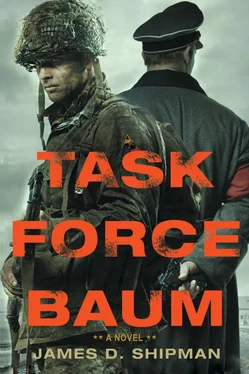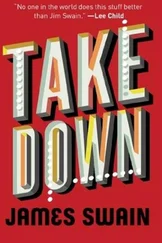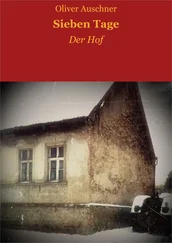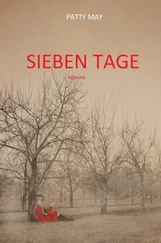For the first time, he allowed himself to think of home. His beautiful Texas. The trees, the streams, the humid summers so many people couldn’t take but that he relished. It was time to go home.
* * *
A month later, a train slowed down at a station. Heat radiated off the platform on the sizzling June day. He looked out the window, recognizing the buildings, the roads, the station. He’d been absent for so long, and now he was back. The car lurched to a halt. He stood, gathering his gear, and ambled down the narrow corridor between the seats. He stepped down the stairs and onto the wooden platform, the heat rising up to meet him.
As he stepped off the train, he heard an excited clatter. He looked up, and there was his family. They rushed forward to greet him.
“Look at my hero!” shouted his mother, embracing him. She stepped back, admiring his uniform. “A Silver Star and a promotion to captain. We’re so proud of you! I’m so happy you’re home. When we heard about the raid, that you’d been captured or killed, we feared the worst.”
Hall’s father stepped forward, shaking his hand, his face beamed. “Congratulations, son. I’m so proud of you. You did everything you needed to do, and now the future is yours.”
Hall smiled, beaming under his parents’ approval. They walked away from the platform, his mother going on and on about how proud everyone was of him; he was the talk of the city.
“Sounds like you worked out things with Stiller,” said his father. “I never cared much for him. He had a pretty big stick up his butt most of the time. None too smart either.”
“Nothing’s changed.”
“Well, if he found it in himself to praise you in the end, he’s okay in my book.”
“He had a reason for supporting me.”
“What do you mean?” his father asked.
“I’ll tell you later,” said Hall. “It’s something we need to consider.”
“Why can’t you tell us now?” asked his mother.
“It’s not for you.”
He saw his mother’s face flinch, but she didn’t say anything else. She knew better than to stick her nose into the male business of the family.
The car whisked through the streets of Spokane, starting up the south hill toward the family’s historic home.
“Mary Alister was asking about you,” said his mother. “You remember Mary?”
He did. A young woman he’d known a little from the neighborhood. She was beautiful and from an influential family. He wasn’t sure he was ready to settle down just yet. He’d like a little fun first. If he chose law school, he would be busy for three years, and he wasn’t going to go through it with a wife. Still, Mary might make a fun distraction for the summer. No, he would seek his entertainment elsewhere. Her father was a little too important, and they lived too close by. There should be plenty of entertainment from other local girls he could afford to ruin. There would be plenty of time for Mary when he was ready.
“Did you hear me about Mary?” his mother repeated.
“Don’t trouble him about that kind of thing,” his father chastised her. “He just got home. They’ll be plenty of time for that after we’ve mapped out his future. Have you done any thinking about that, my boy? About what’s next?”
“I have,” he said. “I’m thinking of law school. Then perhaps politics.”
He could see his father practically crowing in the front seat. “That’s my boy. When we get home, let’s take a look at options. I can land you an internship with the firm, then a judicial clerkship. I’ll get you an appointment with our congressman too. Plenty to work on.”
Hall sat back in his seat, his mind planning out his future. He thought of the raid, the fighting, the dead, Stiller’s words of admonition. Image by image he burned away the memories. They had no hold on him now. He had the world in his hands. Nobody could stop him. He still felt the onyx pit—the hollow of his heart he couldn’t fill, the hole he shared with no one. He shook his head, shoving down the guilt, the shame, the loneliness. I won’t think about that right now. Once I have everything and everyone in my power, I’ll be content . Wealth and power are all that matters. That’s all anyone cares about. Then I’ll be loved and respected. Then I’ll be happy.
November 1945
Stiller stepped out of a decrepit bus onto a dusty street in Texas. There was nobody there to greet him. He’d planned it that way. He wanted a little time to just exist, to walk the simple streets, breathe the air, rediscover the civilian world. He wasn’t far from home, no more than an hour by that same bus. He’d jumped off a few stops earlier.
Stiller wasn’t in uniform. He’d changed at the airport, carefully folding away his blouse and trousers. He didn’t want to make a fuss. He’d paused only for a second, to glance at his newest medal. The Distinguished Service Medal. He grinned slightly, rubbing his fingers along the second-highest medal awarded by the US Army. He’d looked around to make sure nobody was watching. He tucked it away, where it would remain. Nobody needed to know about this.
Now, hours later, he strolled through town in a simple shirt and tie, a nobody from nowhere. He found a diner and stepped inside. The waitress smiled at him as he sat down. She brought him a menu, chatting away about the day. She was friendly. Her eyes told him she might want to carry on this conversation later. He thanked her politely, disengaging from the chatter, and looked over the menu. She seemed like a nice woman, but his thoughts were on home and family. He sipped his coffee and closed his eyes, remembering the war, the battles, the raid. He thought about the future. He’d get a little place. He didn’t need much. Maybe he’d start a garden. He’d always wanted one. He imagined the soil, the plants, wiping away the sweat on a humid Saturday afternoon. He smiled to himself. That’s just what he’d do. He looked forward to the future and to the here and now. A simple, contented life.
Task Force Baum
Task Force Baum was a forty-eight-hour raid behind enemy lines ordered by General George Patton for the specific purpose of liberating his son-in-law, Lieutenant Colonel John Waters. The force was made up of just over three hundred men commanded by Captain Abe Baum. Major Alexander Stiller, a staff officer of Patton’s, went along on the raid to identify Waters.
The column was held up initially at the front, and then again at Gemünden when German forces destroyed the bridge over the Main. The convoy reached Oflag XIII well behind schedule on March 27, 1945, and fought guards and some reinforcements until the camp was liberated. During the brief battle, Lieutenant Colonel Waters was wounded by a German guard while attempting to secure the surrender of the camp. He required emergency surgery and was too badly hurt to be evacuated by the task force.
Baum discovered immediately on liberation of Oflag XIII that the intelligence on the number of prisoners was grossly underestimated. He had resources to evacuate only a fifth of the POWs, and the rest of the men either broke into small groups and attempted to escape or returned dejectedly to the camp.
Task Force Baum left the POW camp at about 6:00 p.m. on March 27 and was bogged down for hours on winding roads heading back toward Hammelburg. The convoy attempted to escape to the southwest but was stopped at Bonnland and then at Höllrich. Down to a handful of tanks and short on fuel, Baum brought the force to Hill 427, where they could regroup and await the dawn for a final desperate attempt at escape.
In the meantime, the Germans closed in from all directions. When the task force ignited their vehicles to leave, the Germans attacked from every direction, wiping out all of the remaining vehicles and wounding more of the men. Within a few minutes, the vast majority of the Americans involved were killed, wounded, or captured. The prisoners were returned to Oflag XIII or other camps, where most of them were moved farther into Germany and liberated a few weeks later.
Читать дальше












